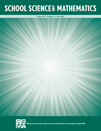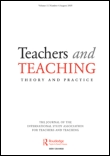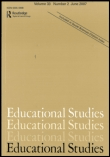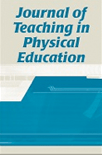
School Science and Mathematics
Scope & Guideline
Advancing education through innovative research in science and mathematics.
Introduction
Aims and Scopes
- Teacher Professional Development:
The journal frequently publishes research on teacher professional development, emphasizing the need for ongoing training and support for educators to enhance their instructional practices in science and mathematics. - Equity and Inclusion in STEM:
A core focus is on addressing equity and inclusion in STEM education, particularly in relation to underrepresented groups and marginalized communities. - Inquiry-Based Learning:
The journal promotes inquiry-based learning as a key pedagogical approach, highlighting studies that explore its effectiveness in engaging students and improving learning outcomes in science and mathematics. - STEM Integration:
Research on the integration of science, technology, engineering, and mathematics (STEM) is a significant theme, with contributions that explore interdisciplinary teaching methods and curriculum development. - Student Engagement and Agency:
The journal emphasizes the importance of fostering student engagement and agency in learning processes, advocating for practices that encourage students to take ownership of their learning. - Research on Teacher Identity:
Explorations of teacher identity and its impact on teaching practices are common, with studies that examine how teachers' beliefs and backgrounds influence their approach to STEM education.
Trending and Emerging
- Social Justice in STEM Education:
There is a growing focus on integrating social justice principles into STEM education, exploring how educators can address inequities and promote inclusive practices in their classrooms. - Technology Integration:
Research on the integration of technology in teaching practices is increasingly prominent, examining how digital tools can enhance inquiry-based learning and facilitate student engagement. - Collaborative Learning Environments:
Studies that investigate collaborative learning strategies and the role of peer interactions in STEM education are on the rise, highlighting the importance of social learning. - Culturally Responsive Pedagogy:
Emerging themes include culturally responsive teaching practices that recognize and value students' diverse backgrounds and experiences, aiming to create more relevant and engaging learning contexts. - Mental Health and Well-Being in Education:
An increasing number of publications address the mental health and well-being of students in STEM education, focusing on how educational practices can support students' emotional and psychological needs.
Declining or Waning
- Traditional Teaching Methods:
There has been a noticeable decrease in publications exploring traditional, lecture-based teaching methods, as the emphasis shifts toward more interactive and student-centered approaches. - Disciplinary Silos:
Research that focuses solely on disciplinary boundaries without integration or collaboration between fields is becoming less common, reflecting a growing recognition of the interconnectedness of STEM subjects. - Standardized Testing Emphasis:
The focus on standardized testing outcomes in science and mathematics education appears to be waning, as educators and researchers advocate for more holistic assessments that consider a broader range of student competencies. - Teacher-Centric Approaches:
There is a declining emphasis on teacher-centric pedagogies, with more research advocating for student-centered learning environments that prioritize student voice and choice.
Similar Journals

Jurnal Penelitian dan Pembelajaran IPA
Bridging Theory and Practice in Science LearningJurnal Penelitian dan Pembelajaran IPA, with ISSN 2477-1422 and E-ISSN 2477-2038, is a leading open-access journal published by the University Sultan Ageng Tirtayasa under the Faculty of Teacher Training & Education (FKIP). Launched in 2015, this journal plays a pivotal role in advancing the field of science education, providing a platform for researchers, educators, and students to share innovative research findings and pedagogical practices. Located in Serang, Banten, Indonesia, the journal aims to bridge the gap between academia and practical application in the science education sector, ensuring that knowledge is accessible to all. With its commitment to quality and transparency, Jurnal Penelitian dan Pembelajaran IPA is dedicated to contributing to the development of effective teaching strategies and enhancing research methodologies in science education, thus influencing future generations of learners.

Teachers and Teaching
Exploring the Dynamics of Teaching and LearningTeachers and Teaching is a premier scholarly journal published by Routledge Journals, Taylor & Francis Ltd, providing an essential platform for researchers, educators, and practitioners in the fields of Education and Arts and Humanities. With an editorial focus on the dynamics of teaching and learning, the journal aims to share innovative research and insightful discussions that enhance pedagogical practices and policy development. Notably, it has achieved a Q1 ranking in both the Arts and Humanities and Education categories, signifying its impact and relevance in educational research, as reflected in its Scopus rankings, with an 84th percentile for Arts and Humanities and a 76th percentile in Education. Although it does not offer open access, the journal provides extensive access options for libraries and institutions, making its rich content available to a wide audience. Spanning from 1995 to 2024, Teachers and Teaching continues to set the standard for high-quality scholarship in the evolving landscape of education, inviting contributions that explore challenges and innovations in teaching methodologies.

EDUCATIONAL STUDIES
Driving Change in Education with Peer-Reviewed ExcellenceEDUCATIONAL STUDIES, published by Routledge Journals, Taylor & Francis Ltd, is a leading journal in the field of education, with a significant impact factor reflecting its contribution to scholarly research. Established in 1975 and set to continue through 2024, this journal provides a platform for high-quality, peer-reviewed articles that explore diverse aspects of education theory, policy, and practice. Based in the United Kingdom, it holds a commendable Q2 ranking in Education and ranks #232 out of 1543 in the Scopus Social Sciences - Education category, positioning it in the 84th percentile. Although currently not open access, its content is available through institutional subscriptions, ensuring the dissemination of innovative research to a global audience. With a commitment to advancing educational discourse, EDUCATIONAL STUDIES is essential reading for researchers, professionals, and students aiming to engage with contemporary issues in education.

AUSTRALIAN EDUCATIONAL RESEARCHER
Innovating Educational Practices for a Brighter FutureAustralian Educational Researcher, an esteemed publication within the field of education, is published by Springer and serves as a vital platform for the dissemination of high-quality research in educational practice and policy. With an impressive Q1 ranking in the 2023 category of Education and a remarkable Scopus rank placing it in the top 20% of its field, this journal provides a prestigious venue for scholars aiming to influence educational outcomes and reforms. Spanning over three decades, from 1985 to 1996 and then again from 2003 to 2024, the journal features a diverse array of research articles that tackle critical issues in education, catering to a wide audience of researchers, educators, and policymakers. Potential contributors and readers will appreciate its commitment to advancing knowledge and improving educational practices, further fostering a community dedicated to educational excellence.

STUDIA MATHEMATICA
Bridging Theory and Application in MathematicsSTUDIA MATHEMATICA is a distinguished journal published by the Polish Academy of Sciences Institute of Mathematics - IMPAN, dedicated to advancing the field of mathematics since its inception. With an ISSN of 0039-3223 and an E-ISSN of 1730-6337, this journal serves as a significant forum for mathematicians worldwide to disseminate innovative research and theoretical advancements. Operating under a stringent peer-review process, STUDIA MATHEMATICA boasts a commendable impact factor that places it in the Q2 category within the mathematics discipline, indicating its critical role in the academic community. Covering a broad spectrum of mathematical topics, the journal aims to encourage interdisciplinary collaboration and foster a deeper understanding of both applied and theoretical aspects of mathematics. Researchers, professionals, and students alike will find a wealth of knowledge in its pages, contributing to the development of the mathematics field from its base in Warsaw, Poland. As it converges various strands of mathematical thought from 1996 to 2024, STUDIA MATHEMATICA continues to uphold its reputation as an essential resource for contemporary mathematical scholarship.

International Journal of Education in Mathematics Science and Technology
Transforming educational outcomes through impactful research and practice.The International Journal of Education in Mathematics Science and Technology (ISSN: 2147-611X, E-ISSN: 2147-611X) is an esteemed publication dedicated to advancing knowledge and research in the fields of mathematics, science, and technology education. Published by Necmettin Erbakan University in Turkey, this journal serves as a vital platform for educators, researchers, and professionals to disseminate innovative methodologies, pedagogical strategies, and educational technologies. With a commendable Q2 ranking in both the Education and Mathematics categories for the year 2022, it clearly exemplifies its impact in these domains, boasting a Scopus rank of #19 out of 74 in Mathematics (miscellaneous) and a position in the 75th percentile. Although the journal has transitioned into open access, it remains committed to fostering a rich dialogue among scholars and practitioners dedicated to enhancing educational outcomes in mathematics and science. Researchers and educators interested in contributing to pedagogical advancements are encouraged to submit their work, thereby playing a part in influencing the future of education.

Journal of Science Education and Technology
Bridging Science and Technology for Enhanced Learning.The Journal of Science Education and Technology, published by SPRINGER, stands as a premier platform in the fields of education and engineering, recognized with a prestigious Q1 ranking in both categories as of 2023. With an ISSN of 1059-0145 and an E-ISSN of 1573-1839, this journal serves as a pivotal resource for researchers, educators, and practitioners alike, emphasizing the integration of scientific inquiry and technological advancements in educational contexts. Since its inception in 1992, the journal has consistently provided high-quality, peer-reviewed research that shapes contemporary practices and methodologies in science education. With its notable Scopus rankings, including a 95th percentile in Social Sciences Education, the journal is essential for anyone eager to enhance their understanding of effective teaching in STEM fields. While the journal is not open access, its contributions are invaluable to advancing knowledge and innovations that are crucial for the progressive education landscape, making it a must-read for scholars and students committed to excellence in science education.

JOURNAL OF TEACHING IN PHYSICAL EDUCATION
Innovating Teaching Strategies for Active Lives.JOURNAL OF TEACHING IN PHYSICAL EDUCATION, published by Human Kinetics Publishers Inc, stands as a premier academic journal committed to advancing knowledge and practice in the realms of physical education and related fields. With an impressive impact factor reflecting its relevance and influence in educational research, this journal boasts a distinguished classification as a Q1 journal in Education and Physical Therapy fields for 2023. Spanning from 1996 to 2024, it offers insightful contributions that engage educators, researchers, and students alike, addressing the evolving landscape of teaching methodologies and their implications for student health and fitness. The journal is accessible via traditional subscription models, providing a platform for innovative studies that aim to enhance teaching effectiveness and athletic performance. With a firm focus on interdisciplinary approaches, it plays a pivotal role in shaping future curricula in physical education and sports medicine.

ZDM-Mathematics Education
Transforming Teaching Practices in MathematicsZDM - Mathematics Education, published by Springer Heidelberg, is a premier academic journal dedicated to the advancement of research and practice in mathematics education. With an impressive impact factor and recognized as a leader in its field, this journal provides a vital platform for disseminating innovative pedagogical strategies, empirical studies, and theoretical discussions surrounding mathematics teaching and learning. The journal operates as a valuable resource for the educational community, holding a distinguished Q1 ranking in both Education and Mathematics categories as of 2023, showcasing its prominence among international academic publications. Covering a broad spectrum of topics, ZDM-Mathematics Education aims to foster collaboration, inspire educational reform, and support the professional development of educators worldwide. With the convergence of years extending from 1997 to 2024, it continues to shape discourse in the domain of mathematics education, appealing to researchers, educators, and policymakers alike.

International Electronic Journal of Mathematics Education
Exploring New Horizons in Mathematics Teaching and LearningInternational Electronic Journal of Mathematics Education (IEJME) is a premier platform dedicated to advancing the field of mathematics education through rigorous research and innovation. Published by MODESTUM LTD, this interdisciplinary journal focuses on the pedagogical, theoretical, and empirical aspects of mathematics education, facilitating a deep understanding of teaching practices, learning methods, and curriculum development. With its commitment to open access, IEJME ensures that research findings are accessible to a global audience, fostering collaborative efforts among educators, researchers, and practitioners. The journal has maintained a commendable position in academic rankings, holding a Rank of #114/399 in General Mathematics and #782/1543 in Education within Scopus, highlighting its significant contribution to the scholarly community. By publishing high-quality research from 2009 to 2016 and 2021 to 2024, IEJME continues to serve as an essential resource for those invested in enhancing mathematical understanding in educational contexts, inspiring future generations of mathematicians and educators.